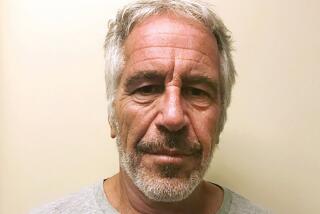Yugoslavia Told to Prevent Genocide : World Court: But the justices stop short of actually accusing Serbia and Montenegro of mass crimes in Bosnia.
THE HAGUE — The World Court on Thursday ordered Yugoslavia to do everything in its power to “prevent . . . the crime of genocide” in Bosnia-Herzegovina, but it ignored that beleaguered Muslim nation’s appeal for international military aid.
The 14-member judicial branch of the United Nations stopped short of actually accusing Serbia and its ally Montenegro of mass extermination or war crimes in Bosnia, which brought the complaint before the court.
“The crime of genocide shocks the conscience of mankind,” the court said without specifically naming Serbia and Montenegro, the two states that formed themselves into the new Yugoslavia after four other republics declared themselves independent nations.
Although disappointed that the court did not address a request to exempt Bosnia from a U.N. arms embargo against all former Yugoslav republics, the Bosnians declared the ruling a moral victory.
“This is a solid verdict against rump Yugoslavia,” said Francis Boyle, the American law professor representing Bosnia’s Muslim government.
However, a Yugoslav diplomat insisted that the non-binding decision was “absolutely not” a defeat.
“It did not accuse anybody of anything,” noted Ljubinko Zivkovic, charge d’affaires of the Yugoslav Embassy in The Hague. “It’s very hard to say we are happy or unhappy.”
Zivkovic added that “Yugoslavia will do its utmost” to comply.
Serbia and Montenegro argue that the fighting in Bosnia-Herzegovina is strictly a civil war and that Yugoslavia is not involved.
The World Court appeared to call that denial into question. In addition to unanimously calling on Yugoslavia “to take all measures within its power to prevent commission of the crime of genocide,” it held that nation responsible for the actions of Bosnian Serbs.
It said that Yugoslavia “should in particular ensure that any military, paramilitary or irregular armed units which may be directed or supported by it, as well as any organizations and persons which may be subject to its control, direction or influence, do not commit any acts of genocide. . . .”
The court also called on Yugoslavia to prevent “direct and public incitement to commit genocide” and “complicity in genocide, whether directed against the Muslim population of Bosnia and Herzegovina or against any other national, ethnical (sic), racial or religious group.”
The justice from Russia, Nikolai Tarassov, cast the sole dissenting vote, signaling Moscow’s continued support of its traditional Serbian allies. Tarassov said parts of the court’s order “are open to the interpretation that the court believes that the government of the Federal Republic of Yugoslavia is indeed involved in such genocidal acts, or at least that it may very well be so involved.”
In voting against that provision of the ruling, Tarassov also complained of the “practically unlimited, ill-defined and vague requirements” set by the court in holding Yugoslavia responsible for ensuring against genocide in Bosnia.
The World Court has no enforcement or punitive powers, but the U.N. Security Council can decide to enforce its rulings.
In New York, Bosnia’s U.N. ambassador, Muhamed Sacirbey, told the British news agency Reuters that he hopes the ruling will persuade the council to lift the arms embargo against his country.
“If, in fact, the council believes international law has any value, they have a clear obligation on the basis on the ruling of the court to take immediate steps,” he told reporters, adding that this would mean lifting the arms embargo.
However, while the United States favors lifting the embargo, Britain, France and Russia as well as most U.N. officials have opposed it, arguing that it would just lead to more bloodshed. A frustrated President Clinton said Tuesday that the United States would do nothing to increase pressure on the Serbs without the agreement of its European allies.
The March 20 complaint by Bosnia was the first accusation of genocide to come before the court since it was founded in 1946, and the court acted on it with unusual speed. It left the door open for additional rulings, depicting Thursday’s decision as an interim, emergency measure.
More to Read
Sign up for Essential California
The most important California stories and recommendations in your inbox every morning.
You may occasionally receive promotional content from the Los Angeles Times.










